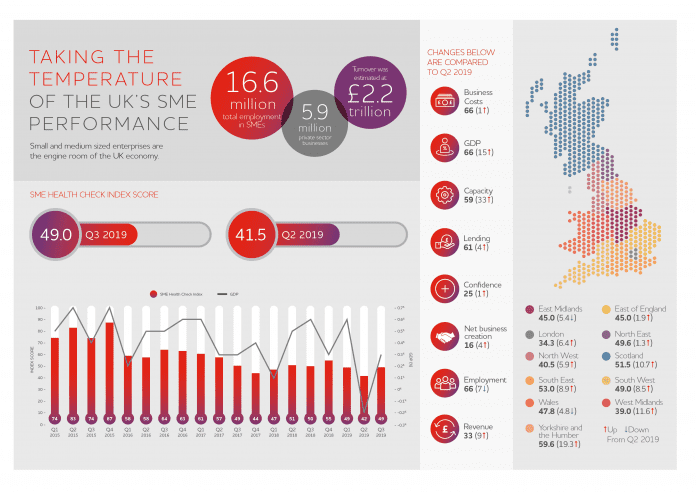Wales SMEs hit by falling numbers of people in employment
- Virgin Money UK SME Health Check Index score for Wales falls 4.8 points in Q3 to 47.8
- The region recorded a decline in the employment, lending and confidence indicators
- Overall Index score rises 7.5 points from the second quarter to reach 49.0 in Q3
- Research shows 3 in 4 SMEs have experienced late payments from customers in the past year, causing disruption for their business
10 December 2019: SMEs in Wales suffered in Q3 2019, due to intense political climate and economic uncertainty. The Virgin Money UK SME Health Check Index score for Wales fell 4.8 points to 47.8, the lowest since the Health Check Index has begun.
The report from Virgin Money UK, owner of Clydesdale and Yorkshire Bank (formerly CYBG), measures SMEs’ performance across eight indicators; business costs, GDP, employment, revenue, capacity, confidence, lending and net business creation.
Wales drop in score was largely due to a 1.6% annual contraction in the number of people in employment from the year to Q3 – the steepest rate of decline in the country.
The value of Welsh SMEs’ outstanding loan and overdraft balances fell by £90 million between Q2 2018 and Q2 2019, pushing down the score for the lending indicator to 48. This suggests that many businesses in Wales are cautious to commit to hard capital investments, given the climate of uncertainty that persists in the UK.
This unease is also reflected in the confidence indicator, which fell by 46 points to 33 in the third quarter of 2019. The results suggest that the revival of economic activity in the UK was not felt as strongly in Wales.
Furthermore, the share of Welsh SMEs that reported an increase in revenues over the past three months dropped to a four-year low.
UK performance also encouraging
The performance of the UK as a whole was encouraging, with a 7.5 point increase recorded from the second quarter, bringing the score to 49.0 in Q3.
The positive increase in the score demonstrates the uptake in economic activity, slowdown in the rate of cost inflation (which fell to its slowest pace since 2017), decline in cost of commercial rents and consistency in the price of tangible assets.
The only indicator to see a decline was employment, which saw the annual rate of employment growth drop by 0.3 percentage points to 1.0%.
Gains in the SME Health Check Index were recorded in nine of the eleven regions covered, with SMEs in most parts of the country benefitting from the rebound in economic activity in Q3.
Yorkshire & Humber and the West Midlands saw the most sizeable improvements, with an increase of 19.3 and 11.6 points respectively. Both of these regions managed to buck the national employment trend in Q3, with each experiencing an acceleration in the annual rate of employment growth.
The only two regions to record a decrease in the SME Health Check Index in Q3 were Wales and the East Midlands. The Index score for Wales was dragged down by a 1.6% annual contraction in the number of people in employment, while the East Midlands’ score was adversely impacted by a fall in the share of SMEs that reported an increase in revenues over the past month.
Late payment continues to bite
The research also included a special report focused on late payments, revealing that 3 in 4 SMEs (74%) have experienced late payments from customers over the last 12 months.
The survey of 1,000 senior SME decision-makers also shows 13% of payments in the last year were received later than the agreed payment terms, causing disruption for businesses, including needing to postpone investment and causing difficulty in paying staff. The report also shows the knock-on effect of late payments, with 88% of SMEs who have paid a supplier late saying that a late payment due from a customer was a contributing factor.
Gavin Opperman, Group Customer Banking Director, at Virgin Money UK, said: “The Q3 SME Health Check results for Wales were disappointing, but it has been a challenging year, with political and economic uncertainty persisting.
“There are undoubtedly challenges to navigate, and political uncertainty remains a thorn in our economy’s side. However, here at Virgin Money we are committed to helping UK SMEs prosper and grow, and with the right strategy and adequate support, we feel confident they can continue on a positive track.
“The special report this quarter highlights the problem of late payments which has long blighted the SME sector. The Government has recently announced new plans to tackle the problem, promising to strengthen the role of Small Business Commissioner, but more can be done. Virgin Money supports the Federation of Small Businesses’ Fair Pay Fair Play campaign and we urge other businesses – particularly large organisations – to support the campaign.”
CYBG Regional Infographics Q3 2019_v1_Wales

| [donate]
| Help keep news FREE for our readersSupporting your local community newspaper/online news outlet is crucial now more than ever. If you believe in independent journalism,then consider making a valuable contribution by making a one-time or monthly donation. We operate in rural areas where providing unbiased news can be challenging. |



















